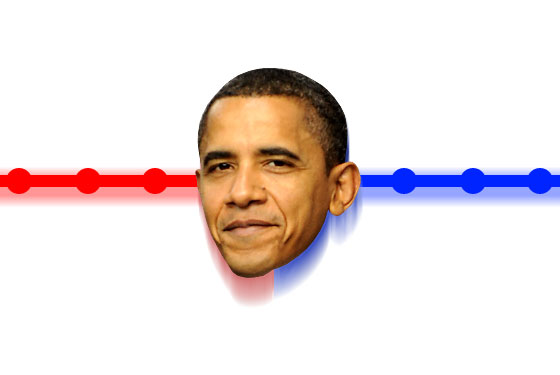
Photo-illustration: Getty Images
The time-honored presidential tradition of the postprimary shift to the center doesn’t usually draw the scorn that Barack Obama is now facing. In recent weeks, Obama has been accused of political opportunism for taking positions on NAFTA, guns, campaign finance, FISA, town-hall debates, and the death penalty that conflict with prior stances or are viewed as counter to his true beliefs. John McCain has also shifted on a number of issues, but because so much was expected of Obama as a new, different kind of politician, it’s a letdown for some that he’s doing things the way they’ve always been done. But just how vulnerable does this make him?
• Paul Krugman thinks that Obama resembles Bill Clinton. He could “do a lot worse than a rerun of the Clinton years,” but “Mr. Obama’s most fervent supporters expect much more.” Progressives “convinced themselves that he was a transformational figure behind a centrist facade,” but Obama has begun to look “even more centrist now than he did before wrapping up the nomination.” His defenders argue that Obama needs to be pragmatic in order to win, “so that he has the power to effect major change.” [NYT]
• Jason Linkins doesn’t believe the “center” is worth moving toward if it simply means staking out the safest positions possible. Obama shouldn’t tack to the far left, but “if there’s a position worth having, it’s worth taking.” On the issue of telecom immunity, Obama would alienate some “Democratic allies” no matter what his stated opinion, but “trying to get through the matter without having to stick his neck out” is worse because it’s “fundamentally at odds with the guiding principles of his campaign.” [HuffPo]
• Victor Davis Hanson claims the Obama strategy is “framed along ten or so key directives that can allow the election of the most leftward candidate in American political history.” The first is moving to the center on “as many problematic issues as possible” and defending charges of flip-flopping by “talking about McCain’s changes of heart.” This also includes talking more about his white grandparents and less about his African father. Step number two: Take a “sorta” position on “any current hot-button issues.” [National Review]
• Jennifer Rubin thinks that Obama himself has revealed to us that “there is no there, there.” In Audacity of Hope Obama wrote, “I serve as a blank screen on which people of vastly different political stripes project their own views.” Perhaps Obama has simply “seized upon a clever formulation (Agent of Change) to attract young and idealistic people longing for meaning.” [Contentions/Commentary]
• Nate Silver contends that Obama’s “shift to the center” may not be as preplanned as it seems. While he was expected to move on certain issues for some time, “others are more a matter of timing and circumstance.” The Supreme Court’s decisions on guns and the death penalty, for example, just happened to come down around the time he took his pragmatic positions on NAFTA and public financing. Consequently, “what might have been four or five isolated incidents stretched out over the course of the summer instead were compressed into a period of a week or two” and created the current meme. What his moves tell us is that Obama “has a pretty keen sensibility for risk management, and tends to come down on the risk-averse side.” [Five Thirty Eight]
• Carol Marin sees the same pattern as others, as Obama takes politically useful positions on warrantless wiretaps, NAFTA, campaign finance, and especially on guns, which the community activist in Obama should know are killing kids a “stone’s throw” from his Hyde Park home. Obama is a “different kind of candidate … but with every carefully calibrated statement he makes, the less moved we may be, and the less different he may become.” [Chicago Sun-Times]
• Evan Thomas contends that since he won the nomination, “Obama has become a fairly traditional presidential candidate, shoring up the party base by telling interest groups what they want to hear.” McCain has also become “an uncharacteristically cautious pol of late,” and so despite our hope for a different kind of election, both candidates are playing “the role of political hack.” Voters, however, can detect when a politician is being a phony, as in the case of John Kerry. [Newsweek]
• Michael Shear writes that the lessons of Kerry haven’t escaped the McCain campaign and its Republican allies, who believe that the election “will be won or lost based on voters’ view of Obama’s character,” which they are now actively portraying as “opportunistic and self-obsessed.” Of course, this strategy may be difficult for McCain, “who has also shifted his positions in the course of the campaign.” [WP] —Dan Amira
Related: Liberals Sniffing Around a Swift-Boat Strategy Against McCain?
Heilemann on Obama’s V.P. Conundrum
For a complete and regularly updated guide to presidential candidates Barack Obama and John McCain — from First Love to Most Embarrassing Gaffe — read the 2008 Electopedia.





























